Professional Ethics Report: Principles, Practices, and Sustainability
VerifiedAdded on 2021/01/01
|16
|5080
|117
Report
AI Summary
This report delves into the realm of professional ethics, specifically within the context of the finance and accounting sector, using KPMG as a case study. It begins by defining professional ethics and outlining the fundamental principles of ethical behavior, including integrity, objectivity, professional competence, confidentiality, and professional conduct. The report then examines relevant legal, regulatory, and ethical requirements, emphasizing the roles of professional bodies like the IFAC and ACCA. It explores the importance of codes of conduct, the risks associated with improper practices, and strategies for maintaining up-to-date knowledge. Furthermore, the report discusses ethical conduct with clients, colleagues, and other stakeholders, emphasizing objectivity, adherence to values, and confidentiality. It details reporting procedures for unethical behavior and explores strategies to prevent ethical conflicts. Finally, the report highlights the importance of an ethical approach to sustainability and the responsibilities of finance professionals in upholding sustainability principles.
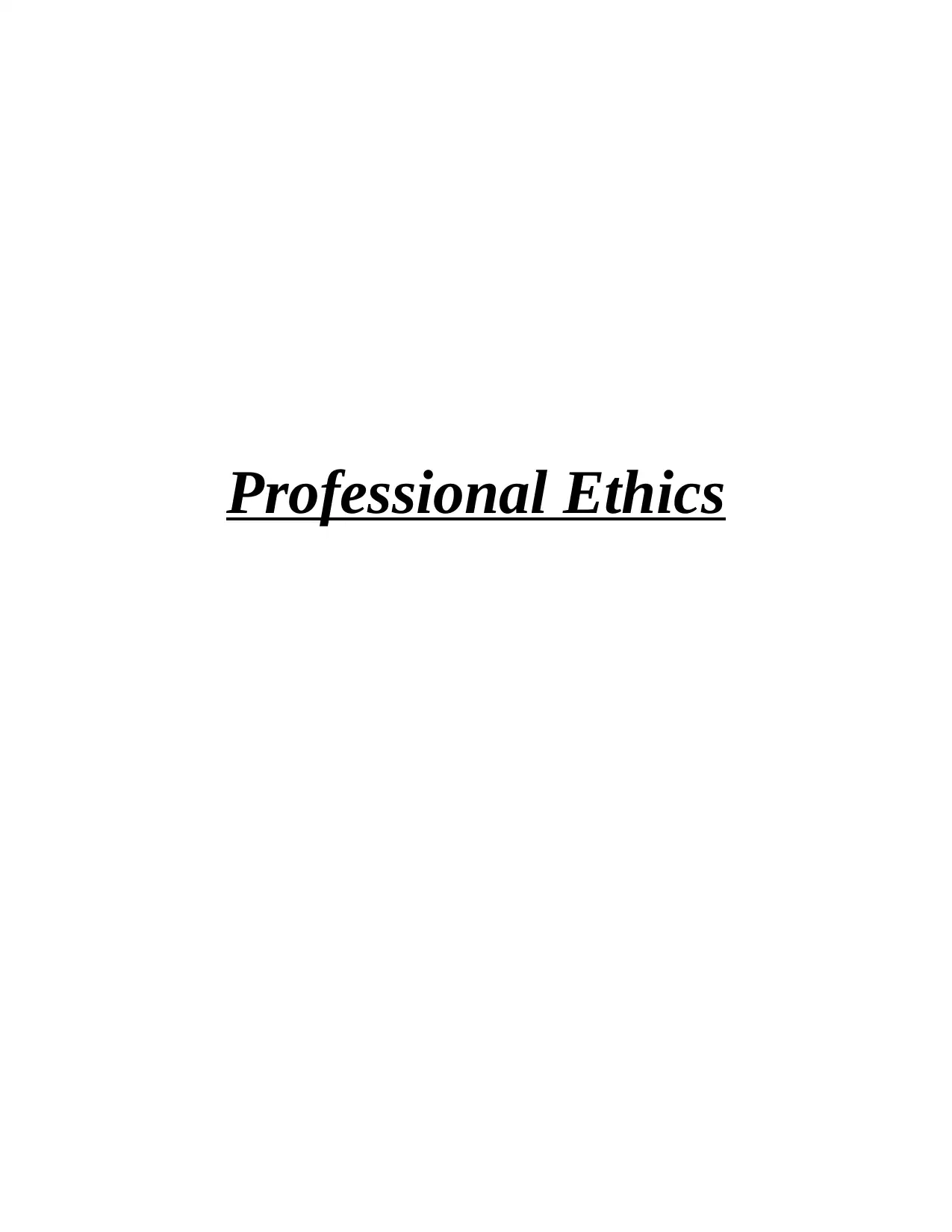
Professional Ethics
Paraphrase This Document
Need a fresh take? Get an instant paraphrase of this document with our AI Paraphraser
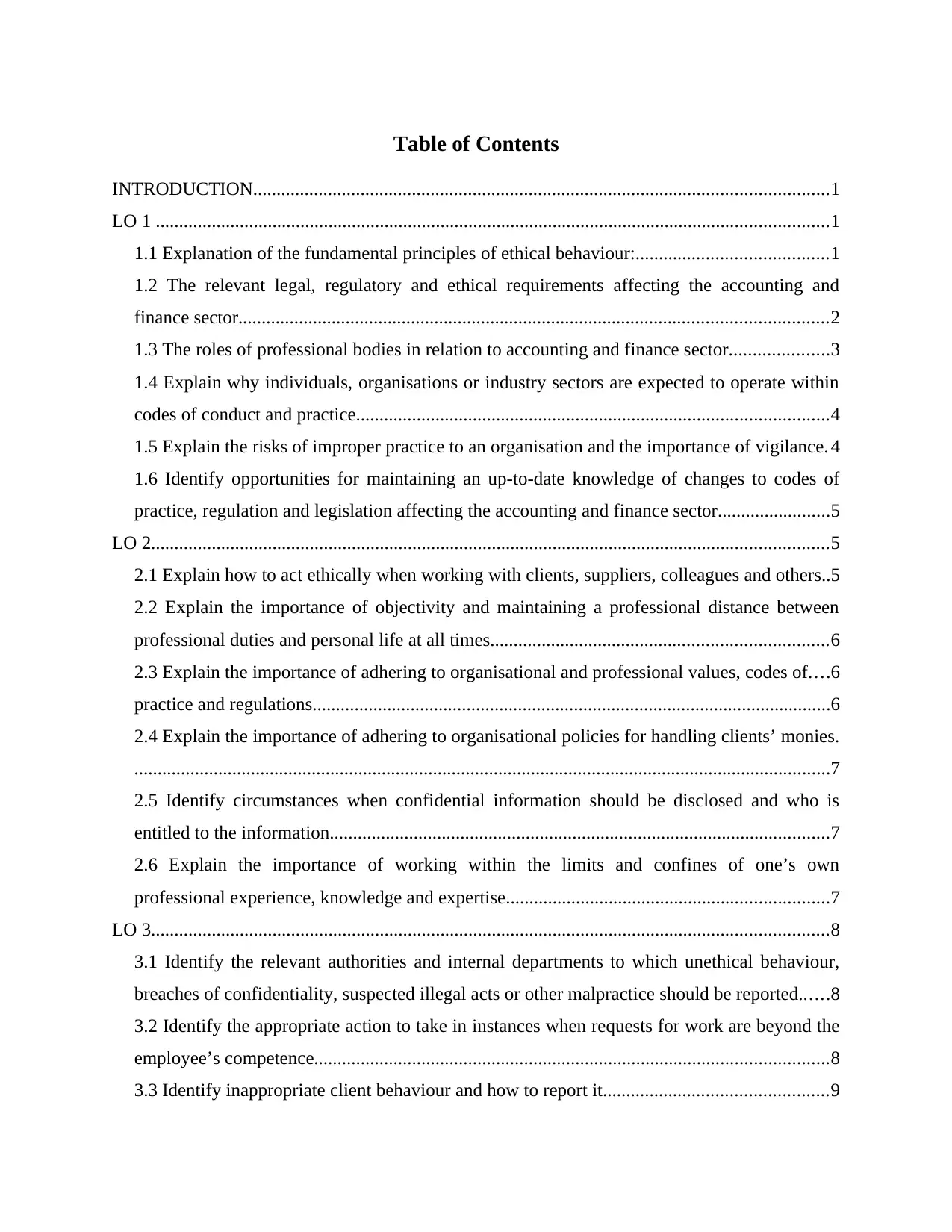
Table of Contents
INTRODUCTION...........................................................................................................................1
LO 1 ................................................................................................................................................1
1.1 Explanation of the fundamental principles of ethical behaviour:.........................................1
1.2 The relevant legal, regulatory and ethical requirements affecting the accounting and
finance sector..............................................................................................................................2
1.3 The roles of professional bodies in relation to accounting and finance sector.....................3
1.4 Explain why individuals, organisations or industry sectors are expected to operate within
codes of conduct and practice.....................................................................................................4
1.5 Explain the risks of improper practice to an organisation and the importance of vigilance. 4
1.6 Identify opportunities for maintaining an up-to-date knowledge of changes to codes of
practice, regulation and legislation affecting the accounting and finance sector........................5
LO 2.................................................................................................................................................5
2.1 Explain how to act ethically when working with clients, suppliers, colleagues and others..5
2.2 Explain the importance of objectivity and maintaining a professional distance between
professional duties and personal life at all times........................................................................6
2.3 Explain the importance of adhering to organisational and professional values, codes of....6
practice and regulations...............................................................................................................6
2.4 Explain the importance of adhering to organisational policies for handling clients’ monies.
.....................................................................................................................................................7
2.5 Identify circumstances when confidential information should be disclosed and who is
entitled to the information...........................................................................................................7
2.6 Explain the importance of working within the limits and confines of one’s own
professional experience, knowledge and expertise.....................................................................7
LO 3.................................................................................................................................................8
3.1 Identify the relevant authorities and internal departments to which unethical behaviour,
breaches of confidentiality, suspected illegal acts or other malpractice should be reported......8
3.2 Identify the appropriate action to take in instances when requests for work are beyond the
employee’s competence..............................................................................................................8
3.3 Identify inappropriate client behaviour and how to report it................................................9
INTRODUCTION...........................................................................................................................1
LO 1 ................................................................................................................................................1
1.1 Explanation of the fundamental principles of ethical behaviour:.........................................1
1.2 The relevant legal, regulatory and ethical requirements affecting the accounting and
finance sector..............................................................................................................................2
1.3 The roles of professional bodies in relation to accounting and finance sector.....................3
1.4 Explain why individuals, organisations or industry sectors are expected to operate within
codes of conduct and practice.....................................................................................................4
1.5 Explain the risks of improper practice to an organisation and the importance of vigilance. 4
1.6 Identify opportunities for maintaining an up-to-date knowledge of changes to codes of
practice, regulation and legislation affecting the accounting and finance sector........................5
LO 2.................................................................................................................................................5
2.1 Explain how to act ethically when working with clients, suppliers, colleagues and others..5
2.2 Explain the importance of objectivity and maintaining a professional distance between
professional duties and personal life at all times........................................................................6
2.3 Explain the importance of adhering to organisational and professional values, codes of....6
practice and regulations...............................................................................................................6
2.4 Explain the importance of adhering to organisational policies for handling clients’ monies.
.....................................................................................................................................................7
2.5 Identify circumstances when confidential information should be disclosed and who is
entitled to the information...........................................................................................................7
2.6 Explain the importance of working within the limits and confines of one’s own
professional experience, knowledge and expertise.....................................................................7
LO 3.................................................................................................................................................8
3.1 Identify the relevant authorities and internal departments to which unethical behaviour,
breaches of confidentiality, suspected illegal acts or other malpractice should be reported......8
3.2 Identify the appropriate action to take in instances when requests for work are beyond the
employee’s competence..............................................................................................................8
3.3 Identify inappropriate client behaviour and how to report it................................................9
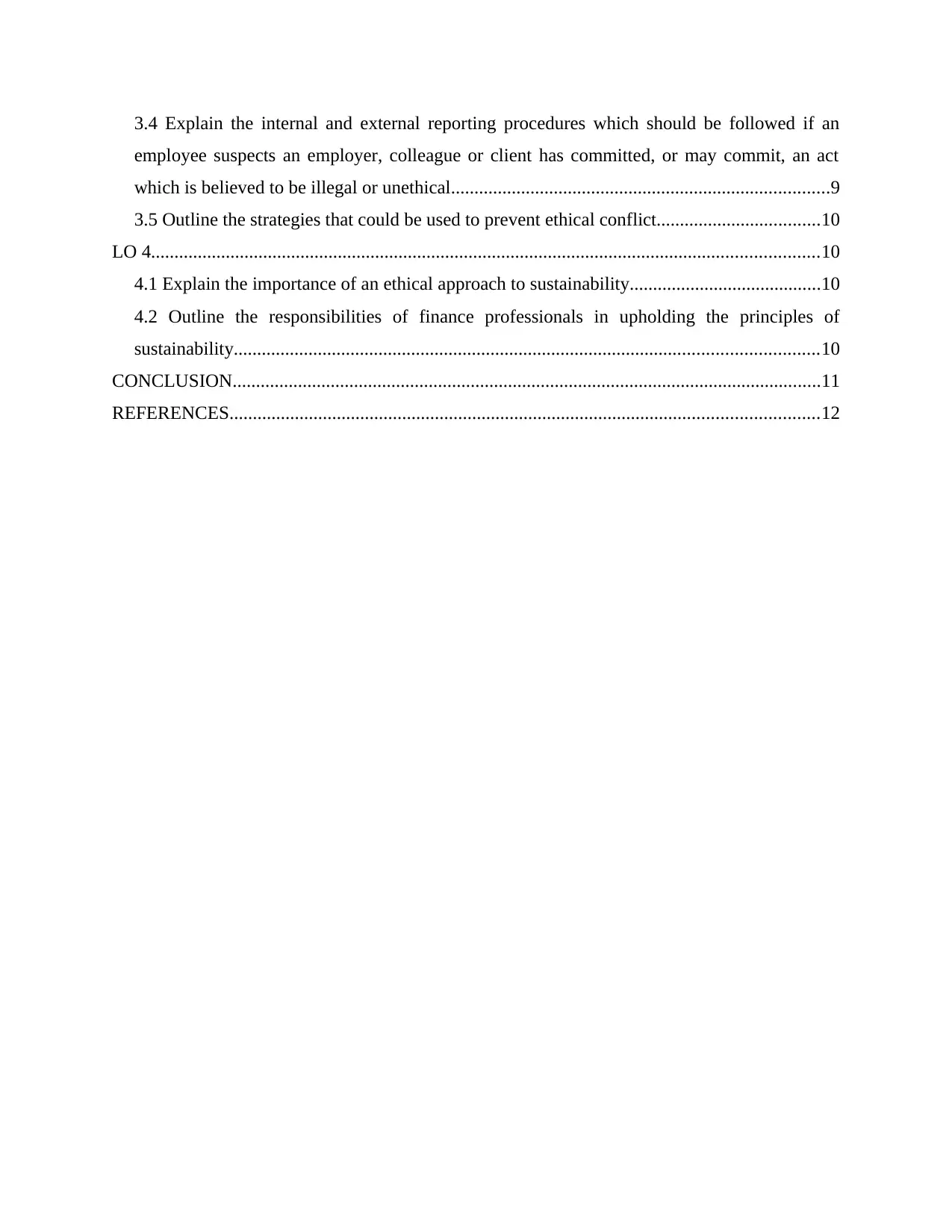
3.4 Explain the internal and external reporting procedures which should be followed if an
employee suspects an employer, colleague or client has committed, or may commit, an act
which is believed to be illegal or unethical.................................................................................9
3.5 Outline the strategies that could be used to prevent ethical conflict...................................10
LO 4...............................................................................................................................................10
4.1 Explain the importance of an ethical approach to sustainability.........................................10
4.2 Outline the responsibilities of finance professionals in upholding the principles of
sustainability.............................................................................................................................10
CONCLUSION..............................................................................................................................11
REFERENCES..............................................................................................................................12
employee suspects an employer, colleague or client has committed, or may commit, an act
which is believed to be illegal or unethical.................................................................................9
3.5 Outline the strategies that could be used to prevent ethical conflict...................................10
LO 4...............................................................................................................................................10
4.1 Explain the importance of an ethical approach to sustainability.........................................10
4.2 Outline the responsibilities of finance professionals in upholding the principles of
sustainability.............................................................................................................................10
CONCLUSION..............................................................................................................................11
REFERENCES..............................................................................................................................12
⊘ This is a preview!⊘
Do you want full access?
Subscribe today to unlock all pages.

Trusted by 1+ million students worldwide

Paraphrase This Document
Need a fresh take? Get an instant paraphrase of this document with our AI Paraphraser
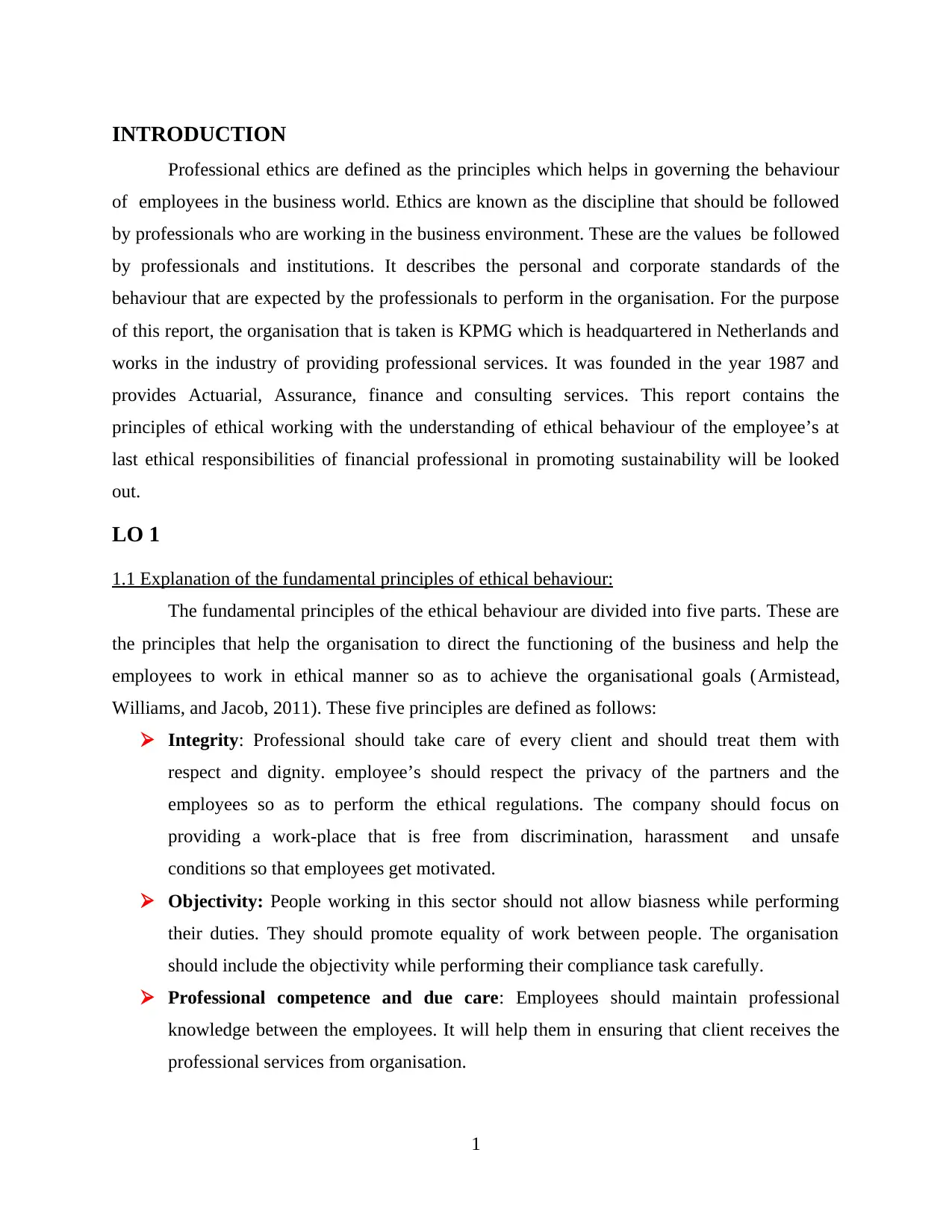
INTRODUCTION
Professional ethics are defined as the principles which helps in governing the behaviour
of employees in the business world. Ethics are known as the discipline that should be followed
by professionals who are working in the business environment. These are the values be followed
by professionals and institutions. It describes the personal and corporate standards of the
behaviour that are expected by the professionals to perform in the organisation. For the purpose
of this report, the organisation that is taken is KPMG which is headquartered in Netherlands and
works in the industry of providing professional services. It was founded in the year 1987 and
provides Actuarial, Assurance, finance and consulting services. This report contains the
principles of ethical working with the understanding of ethical behaviour of the employee’s at
last ethical responsibilities of financial professional in promoting sustainability will be looked
out.
LO 1
1.1 Explanation of the fundamental principles of ethical behaviour:
The fundamental principles of the ethical behaviour are divided into five parts. These are
the principles that help the organisation to direct the functioning of the business and help the
employees to work in ethical manner so as to achieve the organisational goals (Armistead,
Williams, and Jacob, 2011). These five principles are defined as follows:
Integrity: Professional should take care of every client and should treat them with
respect and dignity. employee’s should respect the privacy of the partners and the
employees so as to perform the ethical regulations. The company should focus on
providing a work-place that is free from discrimination, harassment and unsafe
conditions so that employees get motivated.
Objectivity: People working in this sector should not allow biasness while performing
their duties. They should promote equality of work between people. The organisation
should include the objectivity while performing their compliance task carefully.
Professional competence and due care: Employees should maintain professional
knowledge between the employees. It will help them in ensuring that client receives the
professional services from organisation.
1
Professional ethics are defined as the principles which helps in governing the behaviour
of employees in the business world. Ethics are known as the discipline that should be followed
by professionals who are working in the business environment. These are the values be followed
by professionals and institutions. It describes the personal and corporate standards of the
behaviour that are expected by the professionals to perform in the organisation. For the purpose
of this report, the organisation that is taken is KPMG which is headquartered in Netherlands and
works in the industry of providing professional services. It was founded in the year 1987 and
provides Actuarial, Assurance, finance and consulting services. This report contains the
principles of ethical working with the understanding of ethical behaviour of the employee’s at
last ethical responsibilities of financial professional in promoting sustainability will be looked
out.
LO 1
1.1 Explanation of the fundamental principles of ethical behaviour:
The fundamental principles of the ethical behaviour are divided into five parts. These are
the principles that help the organisation to direct the functioning of the business and help the
employees to work in ethical manner so as to achieve the organisational goals (Armistead,
Williams, and Jacob, 2011). These five principles are defined as follows:
Integrity: Professional should take care of every client and should treat them with
respect and dignity. employee’s should respect the privacy of the partners and the
employees so as to perform the ethical regulations. The company should focus on
providing a work-place that is free from discrimination, harassment and unsafe
conditions so that employees get motivated.
Objectivity: People working in this sector should not allow biasness while performing
their duties. They should promote equality of work between people. The organisation
should include the objectivity while performing their compliance task carefully.
Professional competence and due care: Employees should maintain professional
knowledge between the employees. It will help them in ensuring that client receives the
professional services from organisation.
1
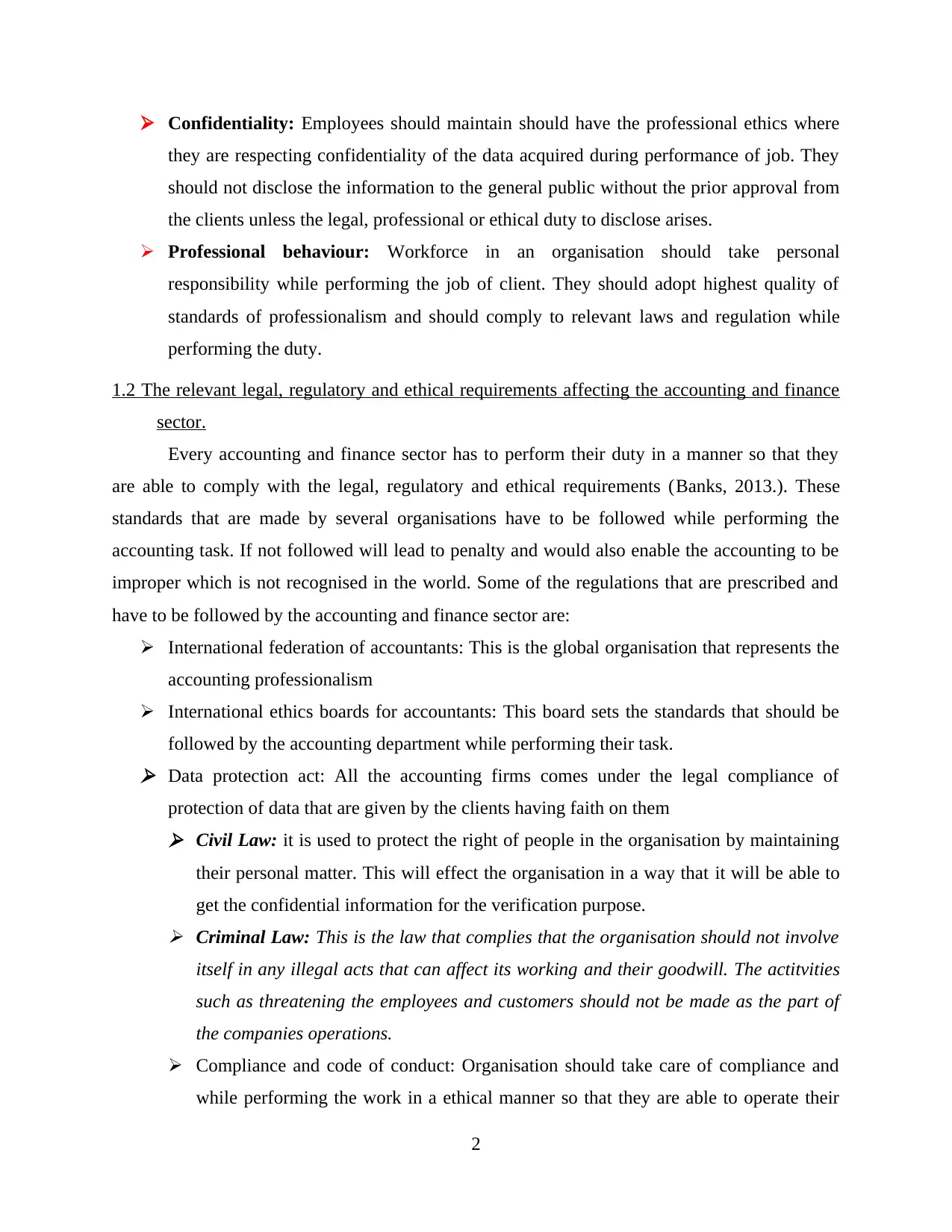
Confidentiality: Employees should maintain should have the professional ethics where
they are respecting confidentiality of the data acquired during performance of job. They
should not disclose the information to the general public without the prior approval from
the clients unless the legal, professional or ethical duty to disclose arises.
Professional behaviour: Workforce in an organisation should take personal
responsibility while performing the job of client. They should adopt highest quality of
standards of professionalism and should comply to relevant laws and regulation while
performing the duty.
1.2 The relevant legal, regulatory and ethical requirements affecting the accounting and finance
sector.
Every accounting and finance sector has to perform their duty in a manner so that they
are able to comply with the legal, regulatory and ethical requirements (Banks, 2013.). These
standards that are made by several organisations have to be followed while performing the
accounting task. If not followed will lead to penalty and would also enable the accounting to be
improper which is not recognised in the world. Some of the regulations that are prescribed and
have to be followed by the accounting and finance sector are:
International federation of accountants: This is the global organisation that represents the
accounting professionalism
International ethics boards for accountants: This board sets the standards that should be
followed by the accounting department while performing their task. Data protection act: All the accounting firms comes under the legal compliance of
protection of data that are given by the clients having faith on them
Civil Law: it is used to protect the right of people in the organisation by maintaining
their personal matter. This will effect the organisation in a way that it will be able to
get the confidential information for the verification purpose.
Criminal Law: This is the law that complies that the organisation should not involve
itself in any illegal acts that can affect its working and their goodwill. The actitvities
such as threatening the employees and customers should not be made as the part of
the companies operations.
Compliance and code of conduct: Organisation should take care of compliance and
while performing the work in a ethical manner so that they are able to operate their
2
they are respecting confidentiality of the data acquired during performance of job. They
should not disclose the information to the general public without the prior approval from
the clients unless the legal, professional or ethical duty to disclose arises.
Professional behaviour: Workforce in an organisation should take personal
responsibility while performing the job of client. They should adopt highest quality of
standards of professionalism and should comply to relevant laws and regulation while
performing the duty.
1.2 The relevant legal, regulatory and ethical requirements affecting the accounting and finance
sector.
Every accounting and finance sector has to perform their duty in a manner so that they
are able to comply with the legal, regulatory and ethical requirements (Banks, 2013.). These
standards that are made by several organisations have to be followed while performing the
accounting task. If not followed will lead to penalty and would also enable the accounting to be
improper which is not recognised in the world. Some of the regulations that are prescribed and
have to be followed by the accounting and finance sector are:
International federation of accountants: This is the global organisation that represents the
accounting professionalism
International ethics boards for accountants: This board sets the standards that should be
followed by the accounting department while performing their task. Data protection act: All the accounting firms comes under the legal compliance of
protection of data that are given by the clients having faith on them
Civil Law: it is used to protect the right of people in the organisation by maintaining
their personal matter. This will effect the organisation in a way that it will be able to
get the confidential information for the verification purpose.
Criminal Law: This is the law that complies that the organisation should not involve
itself in any illegal acts that can affect its working and their goodwill. The actitvities
such as threatening the employees and customers should not be made as the part of
the companies operations.
Compliance and code of conduct: Organisation should take care of compliance and
while performing the work in a ethical manner so that they are able to operate their
2
⊘ This is a preview!⊘
Do you want full access?
Subscribe today to unlock all pages.

Trusted by 1+ million students worldwide
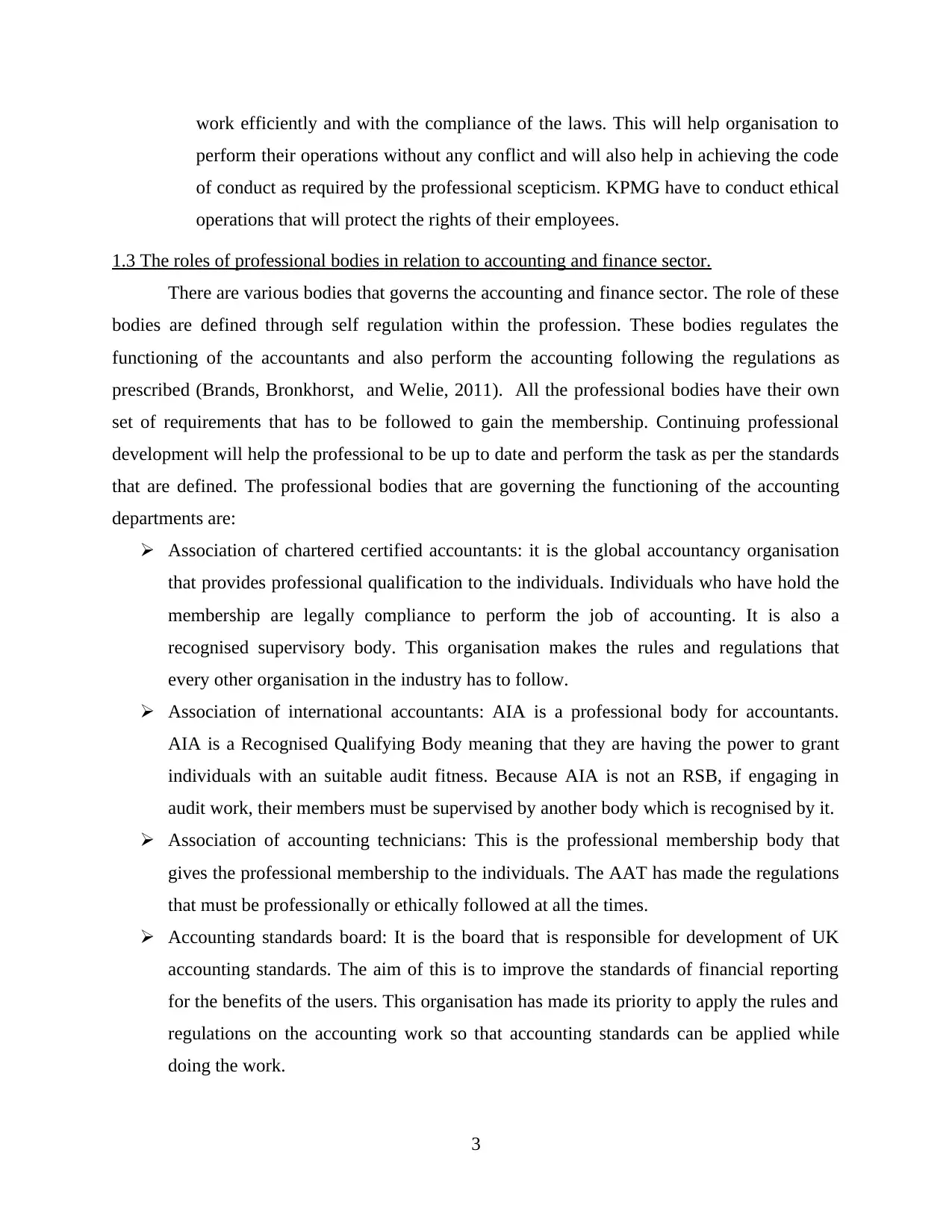
work efficiently and with the compliance of the laws. This will help organisation to
perform their operations without any conflict and will also help in achieving the code
of conduct as required by the professional scepticism. KPMG have to conduct ethical
operations that will protect the rights of their employees.
1.3 The roles of professional bodies in relation to accounting and finance sector.
There are various bodies that governs the accounting and finance sector. The role of these
bodies are defined through self regulation within the profession. These bodies regulates the
functioning of the accountants and also perform the accounting following the regulations as
prescribed (Brands, Bronkhorst, and Welie, 2011). All the professional bodies have their own
set of requirements that has to be followed to gain the membership. Continuing professional
development will help the professional to be up to date and perform the task as per the standards
that are defined. The professional bodies that are governing the functioning of the accounting
departments are:
Association of chartered certified accountants: it is the global accountancy organisation
that provides professional qualification to the individuals. Individuals who have hold the
membership are legally compliance to perform the job of accounting. It is also a
recognised supervisory body. This organisation makes the rules and regulations that
every other organisation in the industry has to follow.
Association of international accountants: AIA is a professional body for accountants.
AIA is a Recognised Qualifying Body meaning that they are having the power to grant
individuals with an suitable audit fitness. Because AIA is not an RSB, if engaging in
audit work, their members must be supervised by another body which is recognised by it.
Association of accounting technicians: This is the professional membership body that
gives the professional membership to the individuals. The AAT has made the regulations
that must be professionally or ethically followed at all the times.
Accounting standards board: It is the board that is responsible for development of UK
accounting standards. The aim of this is to improve the standards of financial reporting
for the benefits of the users. This organisation has made its priority to apply the rules and
regulations on the accounting work so that accounting standards can be applied while
doing the work.
3
perform their operations without any conflict and will also help in achieving the code
of conduct as required by the professional scepticism. KPMG have to conduct ethical
operations that will protect the rights of their employees.
1.3 The roles of professional bodies in relation to accounting and finance sector.
There are various bodies that governs the accounting and finance sector. The role of these
bodies are defined through self regulation within the profession. These bodies regulates the
functioning of the accountants and also perform the accounting following the regulations as
prescribed (Brands, Bronkhorst, and Welie, 2011). All the professional bodies have their own
set of requirements that has to be followed to gain the membership. Continuing professional
development will help the professional to be up to date and perform the task as per the standards
that are defined. The professional bodies that are governing the functioning of the accounting
departments are:
Association of chartered certified accountants: it is the global accountancy organisation
that provides professional qualification to the individuals. Individuals who have hold the
membership are legally compliance to perform the job of accounting. It is also a
recognised supervisory body. This organisation makes the rules and regulations that
every other organisation in the industry has to follow.
Association of international accountants: AIA is a professional body for accountants.
AIA is a Recognised Qualifying Body meaning that they are having the power to grant
individuals with an suitable audit fitness. Because AIA is not an RSB, if engaging in
audit work, their members must be supervised by another body which is recognised by it.
Association of accounting technicians: This is the professional membership body that
gives the professional membership to the individuals. The AAT has made the regulations
that must be professionally or ethically followed at all the times.
Accounting standards board: It is the board that is responsible for development of UK
accounting standards. The aim of this is to improve the standards of financial reporting
for the benefits of the users. This organisation has made its priority to apply the rules and
regulations on the accounting work so that accounting standards can be applied while
doing the work.
3
Paraphrase This Document
Need a fresh take? Get an instant paraphrase of this document with our AI Paraphraser
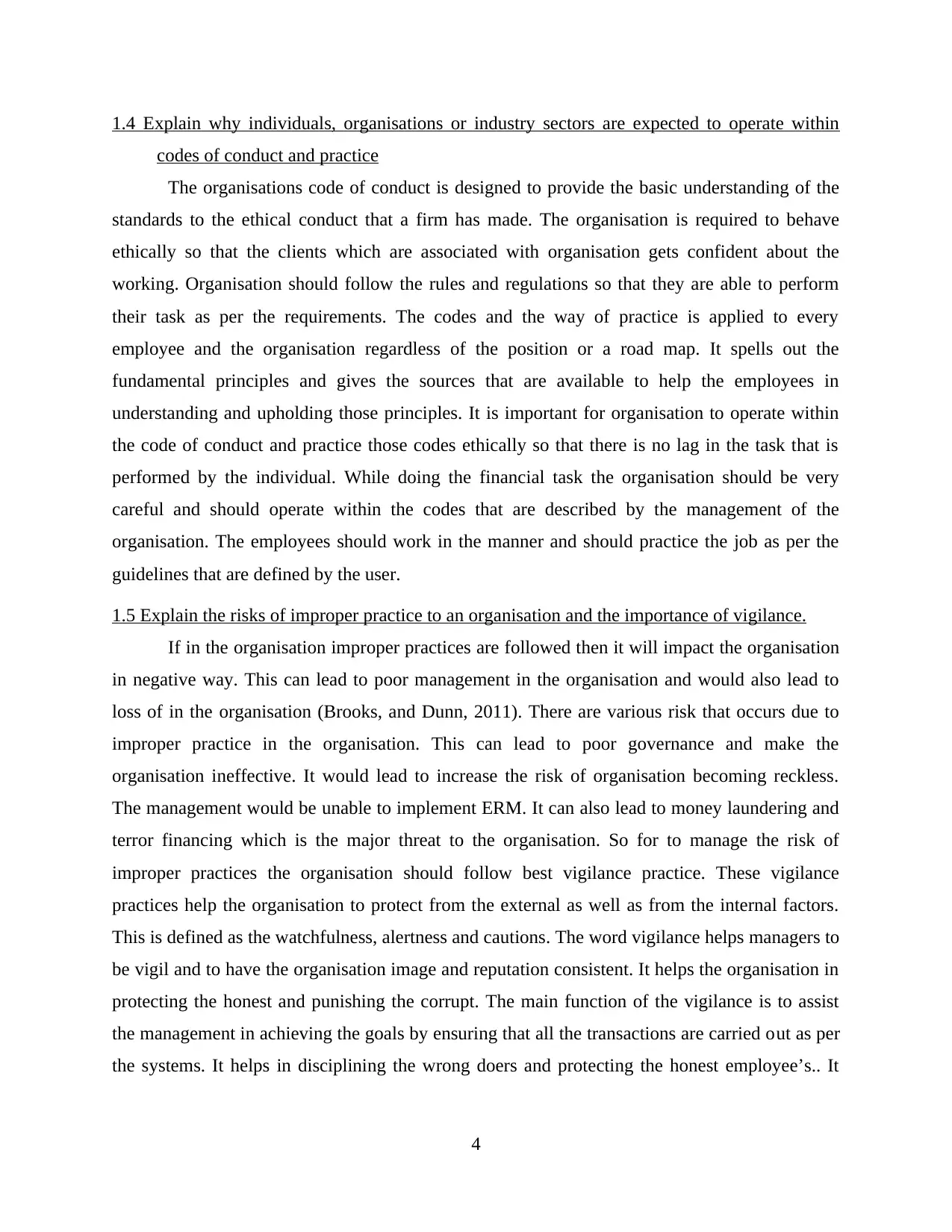
1.4 Explain why individuals, organisations or industry sectors are expected to operate within
codes of conduct and practice
The organisations code of conduct is designed to provide the basic understanding of the
standards to the ethical conduct that a firm has made. The organisation is required to behave
ethically so that the clients which are associated with organisation gets confident about the
working. Organisation should follow the rules and regulations so that they are able to perform
their task as per the requirements. The codes and the way of practice is applied to every
employee and the organisation regardless of the position or a road map. It spells out the
fundamental principles and gives the sources that are available to help the employees in
understanding and upholding those principles. It is important for organisation to operate within
the code of conduct and practice those codes ethically so that there is no lag in the task that is
performed by the individual. While doing the financial task the organisation should be very
careful and should operate within the codes that are described by the management of the
organisation. The employees should work in the manner and should practice the job as per the
guidelines that are defined by the user.
1.5 Explain the risks of improper practice to an organisation and the importance of vigilance.
If in the organisation improper practices are followed then it will impact the organisation
in negative way. This can lead to poor management in the organisation and would also lead to
loss of in the organisation (Brooks, and Dunn, 2011). There are various risk that occurs due to
improper practice in the organisation. This can lead to poor governance and make the
organisation ineffective. It would lead to increase the risk of organisation becoming reckless.
The management would be unable to implement ERM. It can also lead to money laundering and
terror financing which is the major threat to the organisation. So for to manage the risk of
improper practices the organisation should follow best vigilance practice. These vigilance
practices help the organisation to protect from the external as well as from the internal factors.
This is defined as the watchfulness, alertness and cautions. The word vigilance helps managers to
be vigil and to have the organisation image and reputation consistent. It helps the organisation in
protecting the honest and punishing the corrupt. The main function of the vigilance is to assist
the management in achieving the goals by ensuring that all the transactions are carried out as per
the systems. It helps in disciplining the wrong doers and protecting the honest employee’s.. It
4
codes of conduct and practice
The organisations code of conduct is designed to provide the basic understanding of the
standards to the ethical conduct that a firm has made. The organisation is required to behave
ethically so that the clients which are associated with organisation gets confident about the
working. Organisation should follow the rules and regulations so that they are able to perform
their task as per the requirements. The codes and the way of practice is applied to every
employee and the organisation regardless of the position or a road map. It spells out the
fundamental principles and gives the sources that are available to help the employees in
understanding and upholding those principles. It is important for organisation to operate within
the code of conduct and practice those codes ethically so that there is no lag in the task that is
performed by the individual. While doing the financial task the organisation should be very
careful and should operate within the codes that are described by the management of the
organisation. The employees should work in the manner and should practice the job as per the
guidelines that are defined by the user.
1.5 Explain the risks of improper practice to an organisation and the importance of vigilance.
If in the organisation improper practices are followed then it will impact the organisation
in negative way. This can lead to poor management in the organisation and would also lead to
loss of in the organisation (Brooks, and Dunn, 2011). There are various risk that occurs due to
improper practice in the organisation. This can lead to poor governance and make the
organisation ineffective. It would lead to increase the risk of organisation becoming reckless.
The management would be unable to implement ERM. It can also lead to money laundering and
terror financing which is the major threat to the organisation. So for to manage the risk of
improper practices the organisation should follow best vigilance practice. These vigilance
practices help the organisation to protect from the external as well as from the internal factors.
This is defined as the watchfulness, alertness and cautions. The word vigilance helps managers to
be vigil and to have the organisation image and reputation consistent. It helps the organisation in
protecting the honest and punishing the corrupt. The main function of the vigilance is to assist
the management in achieving the goals by ensuring that all the transactions are carried out as per
the systems. It helps in disciplining the wrong doers and protecting the honest employee’s.. It
4
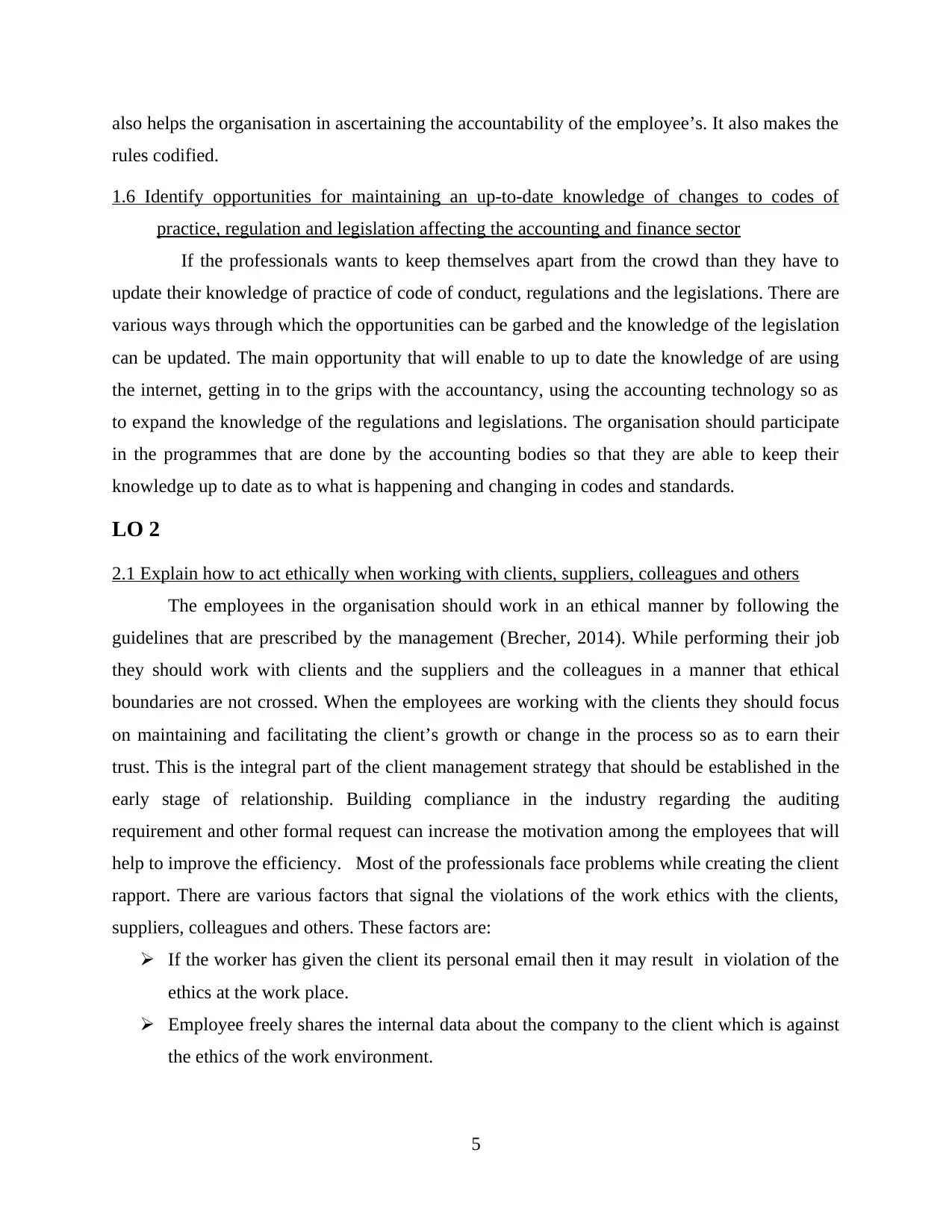
also helps the organisation in ascertaining the accountability of the employee’s. It also makes the
rules codified.
1.6 Identify opportunities for maintaining an up-to-date knowledge of changes to codes of
practice, regulation and legislation affecting the accounting and finance sector
If the professionals wants to keep themselves apart from the crowd than they have to
update their knowledge of practice of code of conduct, regulations and the legislations. There are
various ways through which the opportunities can be garbed and the knowledge of the legislation
can be updated. The main opportunity that will enable to up to date the knowledge of are using
the internet, getting in to the grips with the accountancy, using the accounting technology so as
to expand the knowledge of the regulations and legislations. The organisation should participate
in the programmes that are done by the accounting bodies so that they are able to keep their
knowledge up to date as to what is happening and changing in codes and standards.
LO 2
2.1 Explain how to act ethically when working with clients, suppliers, colleagues and others
The employees in the organisation should work in an ethical manner by following the
guidelines that are prescribed by the management (Brecher, 2014). While performing their job
they should work with clients and the suppliers and the colleagues in a manner that ethical
boundaries are not crossed. When the employees are working with the clients they should focus
on maintaining and facilitating the client’s growth or change in the process so as to earn their
trust. This is the integral part of the client management strategy that should be established in the
early stage of relationship. Building compliance in the industry regarding the auditing
requirement and other formal request can increase the motivation among the employees that will
help to improve the efficiency. Most of the professionals face problems while creating the client
rapport. There are various factors that signal the violations of the work ethics with the clients,
suppliers, colleagues and others. These factors are:
If the worker has given the client its personal email then it may result in violation of the
ethics at the work place.
Employee freely shares the internal data about the company to the client which is against
the ethics of the work environment.
5
rules codified.
1.6 Identify opportunities for maintaining an up-to-date knowledge of changes to codes of
practice, regulation and legislation affecting the accounting and finance sector
If the professionals wants to keep themselves apart from the crowd than they have to
update their knowledge of practice of code of conduct, regulations and the legislations. There are
various ways through which the opportunities can be garbed and the knowledge of the legislation
can be updated. The main opportunity that will enable to up to date the knowledge of are using
the internet, getting in to the grips with the accountancy, using the accounting technology so as
to expand the knowledge of the regulations and legislations. The organisation should participate
in the programmes that are done by the accounting bodies so that they are able to keep their
knowledge up to date as to what is happening and changing in codes and standards.
LO 2
2.1 Explain how to act ethically when working with clients, suppliers, colleagues and others
The employees in the organisation should work in an ethical manner by following the
guidelines that are prescribed by the management (Brecher, 2014). While performing their job
they should work with clients and the suppliers and the colleagues in a manner that ethical
boundaries are not crossed. When the employees are working with the clients they should focus
on maintaining and facilitating the client’s growth or change in the process so as to earn their
trust. This is the integral part of the client management strategy that should be established in the
early stage of relationship. Building compliance in the industry regarding the auditing
requirement and other formal request can increase the motivation among the employees that will
help to improve the efficiency. Most of the professionals face problems while creating the client
rapport. There are various factors that signal the violations of the work ethics with the clients,
suppliers, colleagues and others. These factors are:
If the worker has given the client its personal email then it may result in violation of the
ethics at the work place.
Employee freely shares the internal data about the company to the client which is against
the ethics of the work environment.
5
⊘ This is a preview!⊘
Do you want full access?
Subscribe today to unlock all pages.

Trusted by 1+ million students worldwide
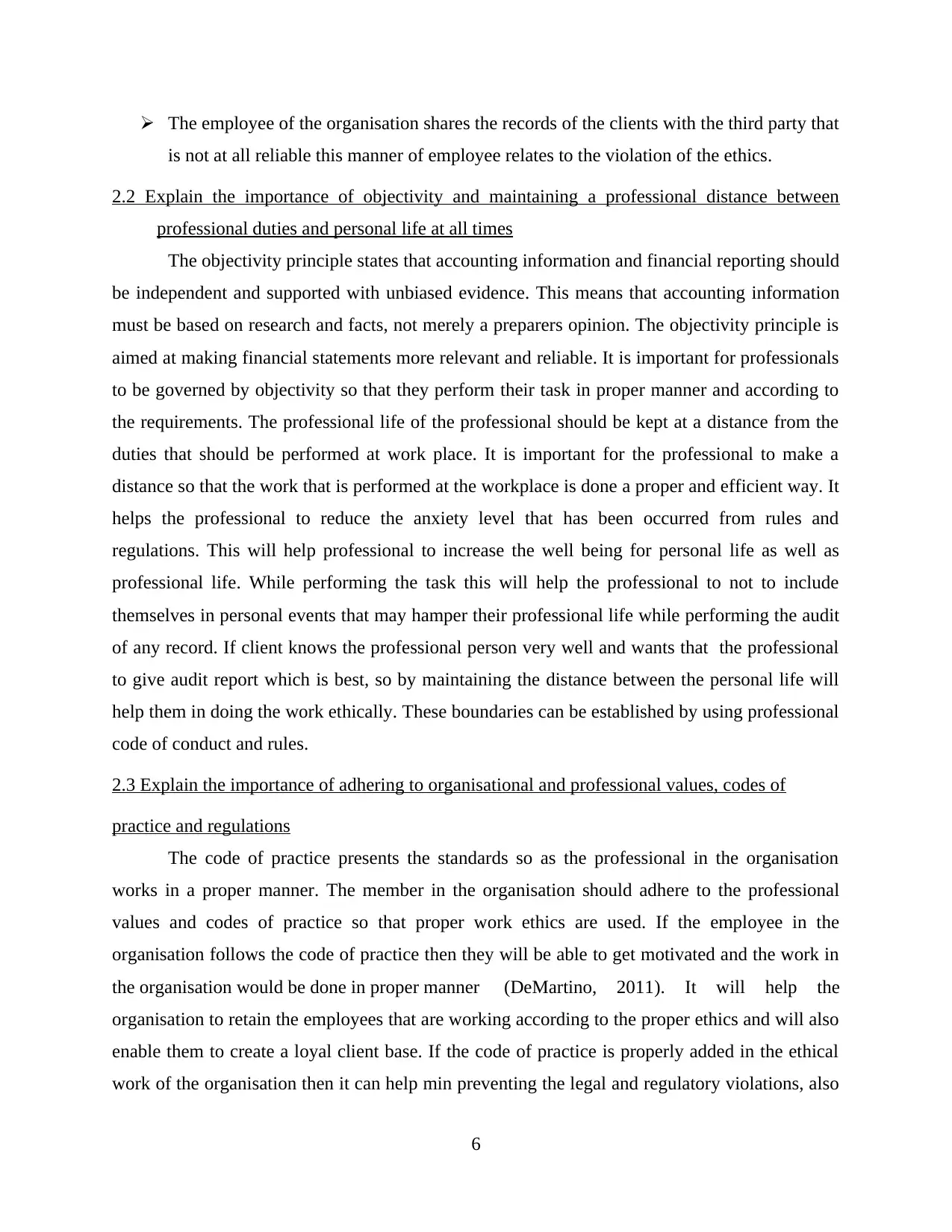
The employee of the organisation shares the records of the clients with the third party that
is not at all reliable this manner of employee relates to the violation of the ethics.
2.2 Explain the importance of objectivity and maintaining a professional distance between
professional duties and personal life at all times
The objectivity principle states that accounting information and financial reporting should
be independent and supported with unbiased evidence. This means that accounting information
must be based on research and facts, not merely a preparers opinion. The objectivity principle is
aimed at making financial statements more relevant and reliable. It is important for professionals
to be governed by objectivity so that they perform their task in proper manner and according to
the requirements. The professional life of the professional should be kept at a distance from the
duties that should be performed at work place. It is important for the professional to make a
distance so that the work that is performed at the workplace is done a proper and efficient way. It
helps the professional to reduce the anxiety level that has been occurred from rules and
regulations. This will help professional to increase the well being for personal life as well as
professional life. While performing the task this will help the professional to not to include
themselves in personal events that may hamper their professional life while performing the audit
of any record. If client knows the professional person very well and wants that the professional
to give audit report which is best, so by maintaining the distance between the personal life will
help them in doing the work ethically. These boundaries can be established by using professional
code of conduct and rules.
2.3 Explain the importance of adhering to organisational and professional values, codes of
practice and regulations
The code of practice presents the standards so as the professional in the organisation
works in a proper manner. The member in the organisation should adhere to the professional
values and codes of practice so that proper work ethics are used. If the employee in the
organisation follows the code of practice then they will be able to get motivated and the work in
the organisation would be done in proper manner (DeMartino, 2011). It will help the
organisation to retain the employees that are working according to the proper ethics and will also
enable them to create a loyal client base. If the code of practice is properly added in the ethical
work of the organisation then it can help min preventing the legal and regulatory violations, also
6
is not at all reliable this manner of employee relates to the violation of the ethics.
2.2 Explain the importance of objectivity and maintaining a professional distance between
professional duties and personal life at all times
The objectivity principle states that accounting information and financial reporting should
be independent and supported with unbiased evidence. This means that accounting information
must be based on research and facts, not merely a preparers opinion. The objectivity principle is
aimed at making financial statements more relevant and reliable. It is important for professionals
to be governed by objectivity so that they perform their task in proper manner and according to
the requirements. The professional life of the professional should be kept at a distance from the
duties that should be performed at work place. It is important for the professional to make a
distance so that the work that is performed at the workplace is done a proper and efficient way. It
helps the professional to reduce the anxiety level that has been occurred from rules and
regulations. This will help professional to increase the well being for personal life as well as
professional life. While performing the task this will help the professional to not to include
themselves in personal events that may hamper their professional life while performing the audit
of any record. If client knows the professional person very well and wants that the professional
to give audit report which is best, so by maintaining the distance between the personal life will
help them in doing the work ethically. These boundaries can be established by using professional
code of conduct and rules.
2.3 Explain the importance of adhering to organisational and professional values, codes of
practice and regulations
The code of practice presents the standards so as the professional in the organisation
works in a proper manner. The member in the organisation should adhere to the professional
values and codes of practice so that proper work ethics are used. If the employee in the
organisation follows the code of practice then they will be able to get motivated and the work in
the organisation would be done in proper manner (DeMartino, 2011). It will help the
organisation to retain the employees that are working according to the proper ethics and will also
enable them to create a loyal client base. If the code of practice is properly added in the ethical
work of the organisation then it can help min preventing the legal and regulatory violations, also
6
Paraphrase This Document
Need a fresh take? Get an instant paraphrase of this document with our AI Paraphraser
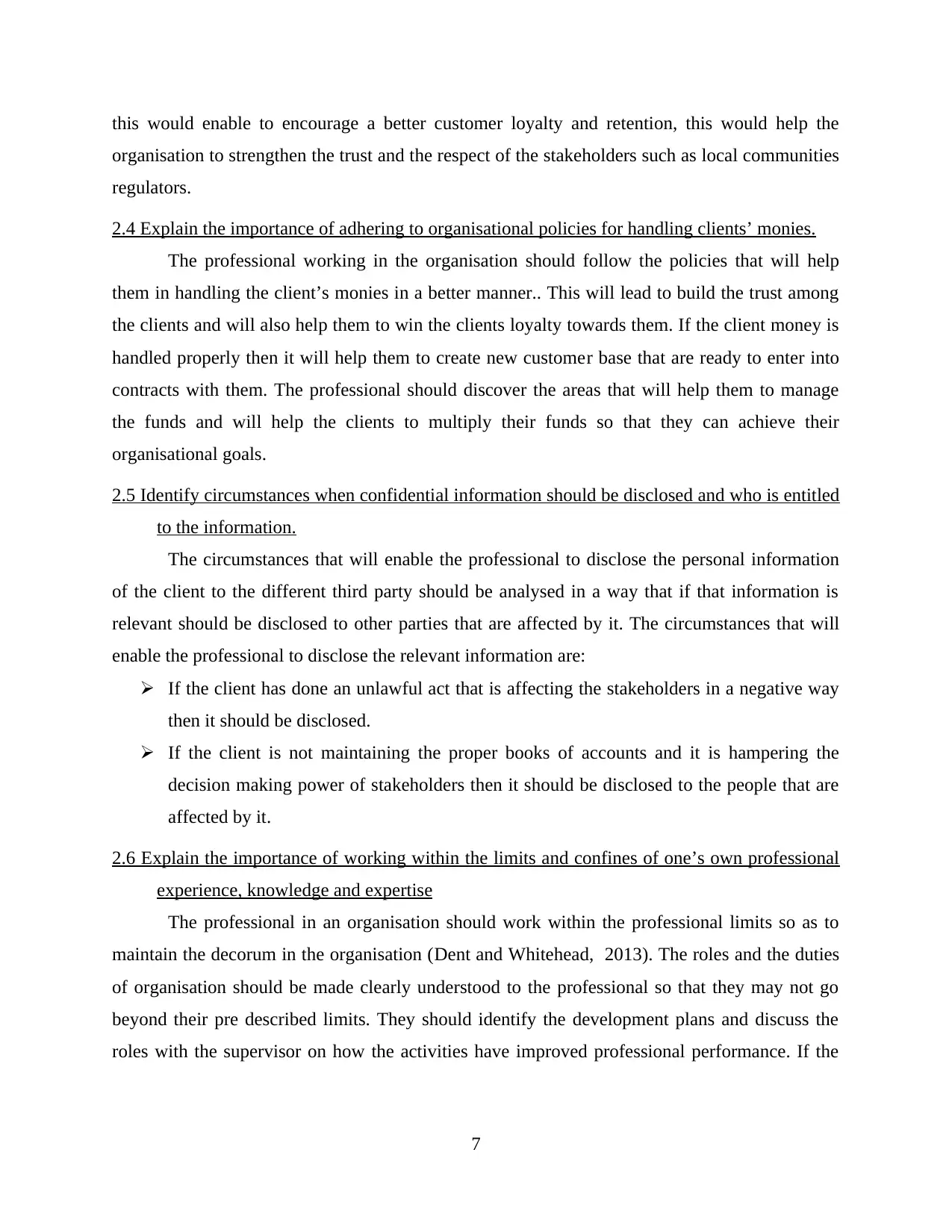
this would enable to encourage a better customer loyalty and retention, this would help the
organisation to strengthen the trust and the respect of the stakeholders such as local communities
regulators.
2.4 Explain the importance of adhering to organisational policies for handling clients’ monies.
The professional working in the organisation should follow the policies that will help
them in handling the client’s monies in a better manner.. This will lead to build the trust among
the clients and will also help them to win the clients loyalty towards them. If the client money is
handled properly then it will help them to create new customer base that are ready to enter into
contracts with them. The professional should discover the areas that will help them to manage
the funds and will help the clients to multiply their funds so that they can achieve their
organisational goals.
2.5 Identify circumstances when confidential information should be disclosed and who is entitled
to the information.
The circumstances that will enable the professional to disclose the personal information
of the client to the different third party should be analysed in a way that if that information is
relevant should be disclosed to other parties that are affected by it. The circumstances that will
enable the professional to disclose the relevant information are:
If the client has done an unlawful act that is affecting the stakeholders in a negative way
then it should be disclosed.
If the client is not maintaining the proper books of accounts and it is hampering the
decision making power of stakeholders then it should be disclosed to the people that are
affected by it.
2.6 Explain the importance of working within the limits and confines of one’s own professional
experience, knowledge and expertise
The professional in an organisation should work within the professional limits so as to
maintain the decorum in the organisation (Dent and Whitehead, 2013). The roles and the duties
of organisation should be made clearly understood to the professional so that they may not go
beyond their pre described limits. They should identify the development plans and discuss the
roles with the supervisor on how the activities have improved professional performance. If the
7
organisation to strengthen the trust and the respect of the stakeholders such as local communities
regulators.
2.4 Explain the importance of adhering to organisational policies for handling clients’ monies.
The professional working in the organisation should follow the policies that will help
them in handling the client’s monies in a better manner.. This will lead to build the trust among
the clients and will also help them to win the clients loyalty towards them. If the client money is
handled properly then it will help them to create new customer base that are ready to enter into
contracts with them. The professional should discover the areas that will help them to manage
the funds and will help the clients to multiply their funds so that they can achieve their
organisational goals.
2.5 Identify circumstances when confidential information should be disclosed and who is entitled
to the information.
The circumstances that will enable the professional to disclose the personal information
of the client to the different third party should be analysed in a way that if that information is
relevant should be disclosed to other parties that are affected by it. The circumstances that will
enable the professional to disclose the relevant information are:
If the client has done an unlawful act that is affecting the stakeholders in a negative way
then it should be disclosed.
If the client is not maintaining the proper books of accounts and it is hampering the
decision making power of stakeholders then it should be disclosed to the people that are
affected by it.
2.6 Explain the importance of working within the limits and confines of one’s own professional
experience, knowledge and expertise
The professional in an organisation should work within the professional limits so as to
maintain the decorum in the organisation (Dent and Whitehead, 2013). The roles and the duties
of organisation should be made clearly understood to the professional so that they may not go
beyond their pre described limits. They should identify the development plans and discuss the
roles with the supervisor on how the activities have improved professional performance. If the
7
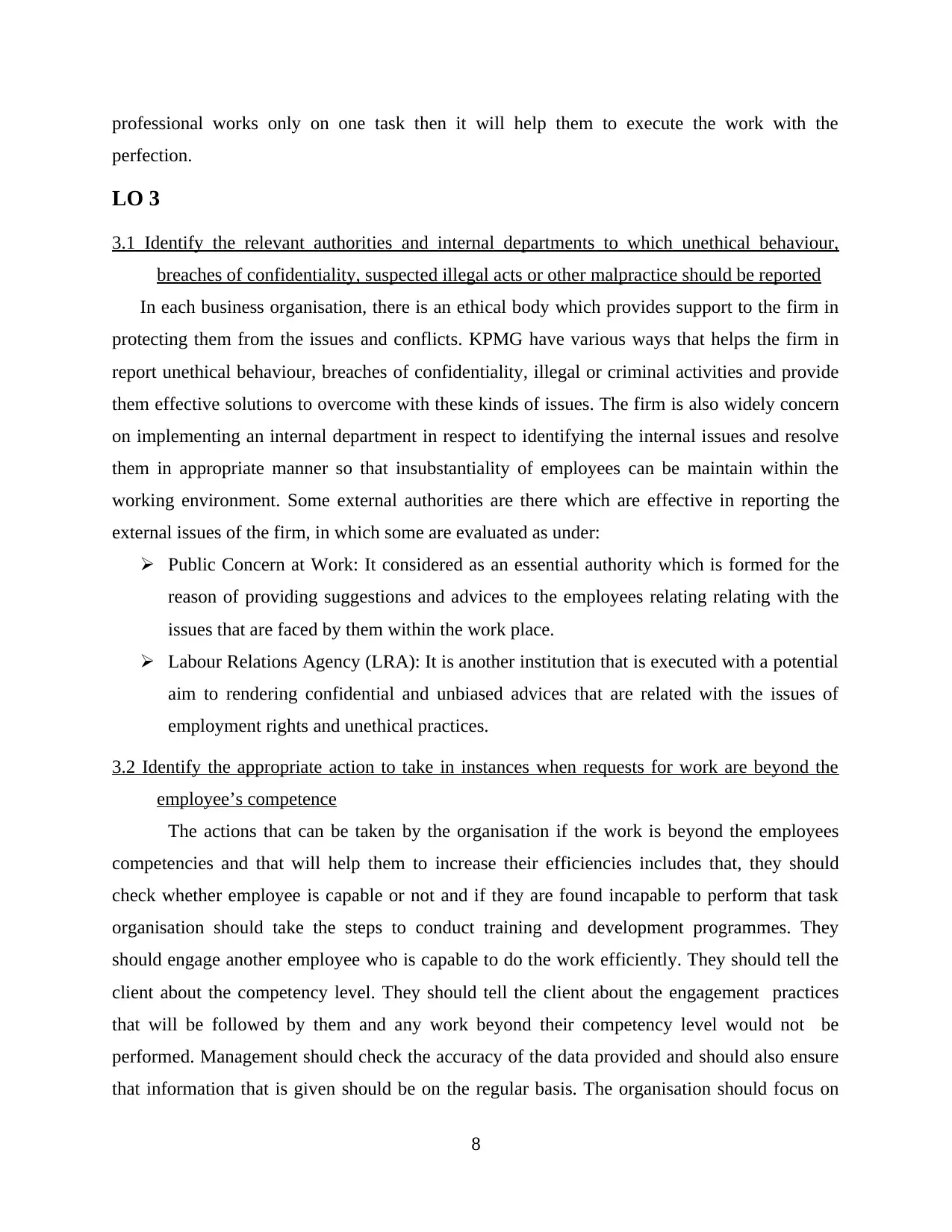
professional works only on one task then it will help them to execute the work with the
perfection.
LO 3
3.1 Identify the relevant authorities and internal departments to which unethical behaviour,
breaches of confidentiality, suspected illegal acts or other malpractice should be reported
In each business organisation, there is an ethical body which provides support to the firm in
protecting them from the issues and conflicts. KPMG have various ways that helps the firm in
report unethical behaviour, breaches of confidentiality, illegal or criminal activities and provide
them effective solutions to overcome with these kinds of issues. The firm is also widely concern
on implementing an internal department in respect to identifying the internal issues and resolve
them in appropriate manner so that insubstantiality of employees can be maintain within the
working environment. Some external authorities are there which are effective in reporting the
external issues of the firm, in which some are evaluated as under:
Public Concern at Work: It considered as an essential authority which is formed for the
reason of providing suggestions and advices to the employees relating relating with the
issues that are faced by them within the work place.
Labour Relations Agency (LRA): It is another institution that is executed with a potential
aim to rendering confidential and unbiased advices that are related with the issues of
employment rights and unethical practices.
3.2 Identify the appropriate action to take in instances when requests for work are beyond the
employee’s competence
The actions that can be taken by the organisation if the work is beyond the employees
competencies and that will help them to increase their efficiencies includes that, they should
check whether employee is capable or not and if they are found incapable to perform that task
organisation should take the steps to conduct training and development programmes. They
should engage another employee who is capable to do the work efficiently. They should tell the
client about the competency level. They should tell the client about the engagement practices
that will be followed by them and any work beyond their competency level would not be
performed. Management should check the accuracy of the data provided and should also ensure
that information that is given should be on the regular basis. The organisation should focus on
8
perfection.
LO 3
3.1 Identify the relevant authorities and internal departments to which unethical behaviour,
breaches of confidentiality, suspected illegal acts or other malpractice should be reported
In each business organisation, there is an ethical body which provides support to the firm in
protecting them from the issues and conflicts. KPMG have various ways that helps the firm in
report unethical behaviour, breaches of confidentiality, illegal or criminal activities and provide
them effective solutions to overcome with these kinds of issues. The firm is also widely concern
on implementing an internal department in respect to identifying the internal issues and resolve
them in appropriate manner so that insubstantiality of employees can be maintain within the
working environment. Some external authorities are there which are effective in reporting the
external issues of the firm, in which some are evaluated as under:
Public Concern at Work: It considered as an essential authority which is formed for the
reason of providing suggestions and advices to the employees relating relating with the
issues that are faced by them within the work place.
Labour Relations Agency (LRA): It is another institution that is executed with a potential
aim to rendering confidential and unbiased advices that are related with the issues of
employment rights and unethical practices.
3.2 Identify the appropriate action to take in instances when requests for work are beyond the
employee’s competence
The actions that can be taken by the organisation if the work is beyond the employees
competencies and that will help them to increase their efficiencies includes that, they should
check whether employee is capable or not and if they are found incapable to perform that task
organisation should take the steps to conduct training and development programmes. They
should engage another employee who is capable to do the work efficiently. They should tell the
client about the competency level. They should tell the client about the engagement practices
that will be followed by them and any work beyond their competency level would not be
performed. Management should check the accuracy of the data provided and should also ensure
that information that is given should be on the regular basis. The organisation should focus on
8
⊘ This is a preview!⊘
Do you want full access?
Subscribe today to unlock all pages.

Trusted by 1+ million students worldwide
1 out of 16
Related Documents
Your All-in-One AI-Powered Toolkit for Academic Success.
+13062052269
info@desklib.com
Available 24*7 on WhatsApp / Email
![[object Object]](/_next/static/media/star-bottom.7253800d.svg)
Unlock your academic potential
Copyright © 2020–2026 A2Z Services. All Rights Reserved. Developed and managed by ZUCOL.





